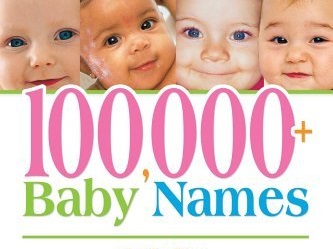We have a new granddaughter on the way, and our daughter has asked us to help brainstorm Bible names. This new grandbaby will join sisters Ruth and Lois, both from the Bible, plus cousins named Josiah, Asher, Judah, Susannah, Adriel, and Alethia (Greek for “truth”). As for my wife Sharon and I, we’re named, respectively, for a seaside plain in the Holy Land and a Gospel writer. My own mother was named Agnes (from the Greek for “lamb”) and my father-in-law was Rheubin, for a tribe of Israel. And so it has gone.
Of course, not every biblical expression works so well. My father was joking when he suggested we name one of our sons Gad, for another tribe. And joking aside, some names are so poisoned that the Catholic code of canon law forbids a priest to christen a baby “Judas” or “Jezebel.”
 It’s funny how the popularity of names shifts from generation to generation. You don’t find many girls named Mabel or Gladys or Verna running around church nurseries today. The same goes for Herberts and Ernests. These were current in the 1930s, but not so much now.
It’s funny how the popularity of names shifts from generation to generation. You don’t find many girls named Mabel or Gladys or Verna running around church nurseries today. The same goes for Herberts and Ernests. These were current in the 1930s, but not so much now.
In my childhood, there were a lot of Janes and Sandras, Bobs and Bills in school with me. Then the 60s and 70s brought us more aesthetic names, such as Heather and LaToya. The 80s saw the re-emergence of strikingly biblical names—Jareds and Miriams, Elijahs and Zechariahs. These harkened back to the 19th century, when wagon train rosters listed a host of Lemuels, Modecais, Jemimas, and such. Before that came Puritans, with their biblical-virtue names such as Hope, Prudence, and Constance.
Maybe we could turn to another language, where, for instance Peter becomes Boutros in Coptic Arabic (cf. former UN Secretary-General Boutros Boutros-Ghali— “Peter Peterson”), or, more to the point, where we find the German feminine version, Petra. Or we could start with a Greek-based name, such as Dorothy (with its reverse, Theodore, both from “theos” and “doron” for “gift of God”), but then go Hebrew with Natania. The possibilities are endless.
The recent birth of the royal baby in the UK shows that you don’t have to use the Bible to produce a grand name—George Alexander Louis. Only the first name has clear Christian links; it picks up on the 3rd century’s St. George, the dragon-slayer who became the patron saint of England. (Meanwhile, Mohammed has become a favorite first name in Britain, firmly planted in the top 20.)
William Franklin “Billy” Graham and Clive Staples Lewis did just fine without Bible names, and Christian parents shouldn’t feel pressured to turn to Scripture for their choices. But it is fun to see biblical names all over the landscape—from the high art of opera, with Luciano (Luke) Pavarotti and Maria (Mary) Callas, to the popular art of the Rock and Roll Hall of Fame, with Nat(haniel) “King” Cole, Dinah Washington, John Lennon, and Mary Wilson of the Supremes. Such names testify to the sweep of Judeo-Christian culture, wherever it may be found, whether in the statehouse of Germany (Angela—“messenger; angel”—Merkel), Cameroon (Philemon Yang), or the Marshall Islands (Christopher—“Christ bearer”—Loeak).
I mentioned our soon-to-arrive granddaughter to a Jewish doctor the other day, and she suggested Tamara. But I was queasy over associations with Tamar (see Genesis 38) and Mara (Ruth 1:20). So the hunt continues as we grandparents brainstorm on the sidelines. What’s that you say? Martha? Elizabeth? Not bad.